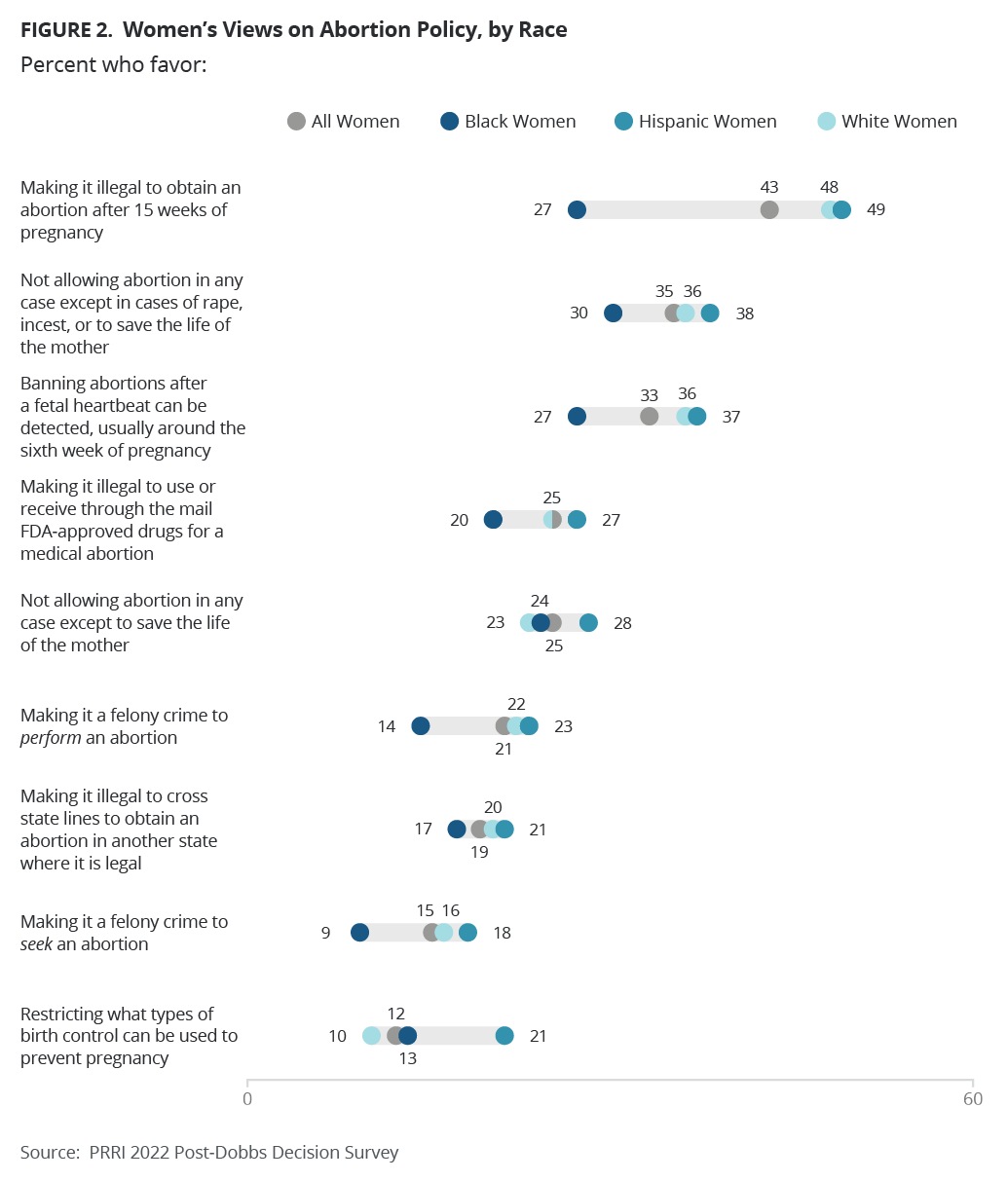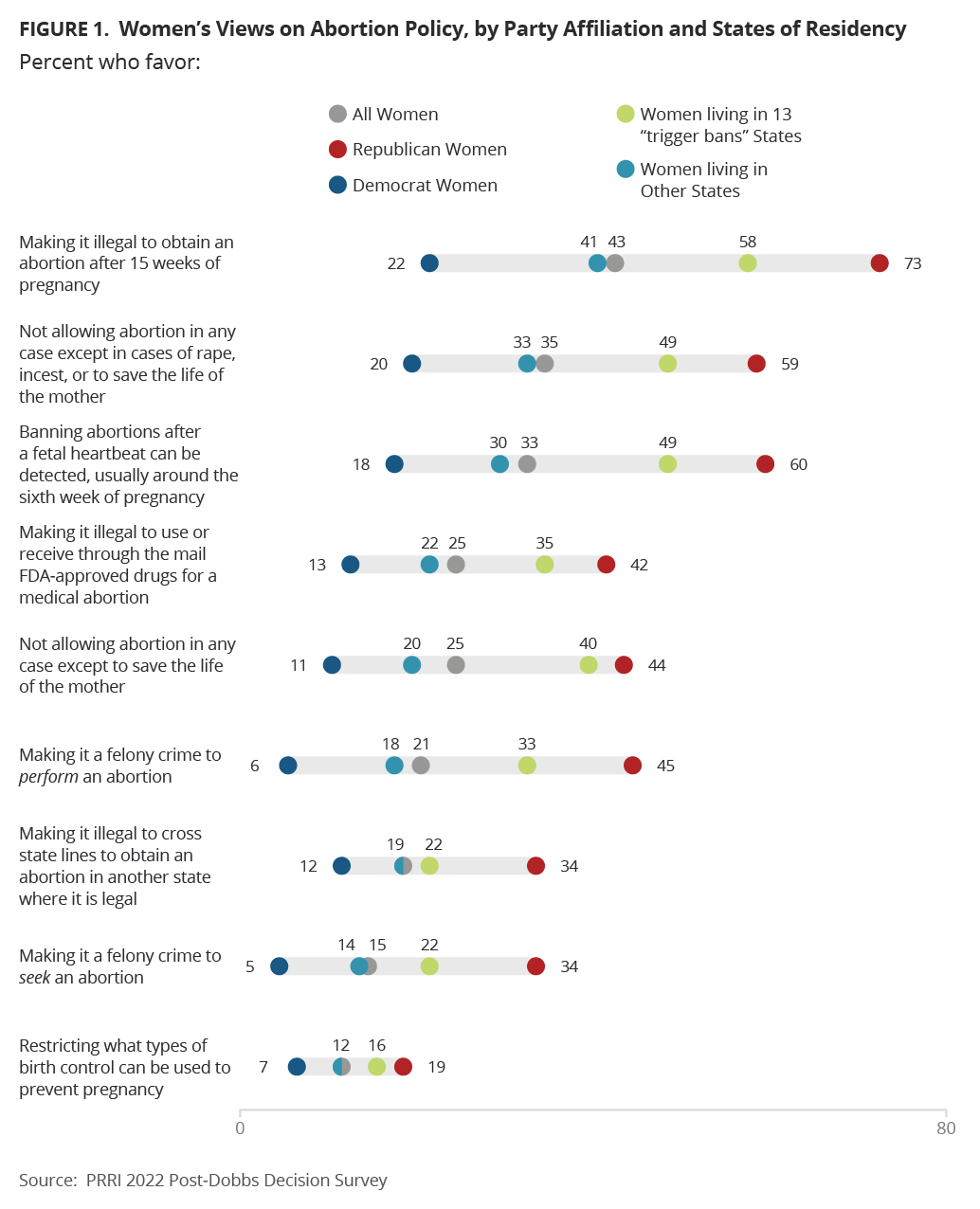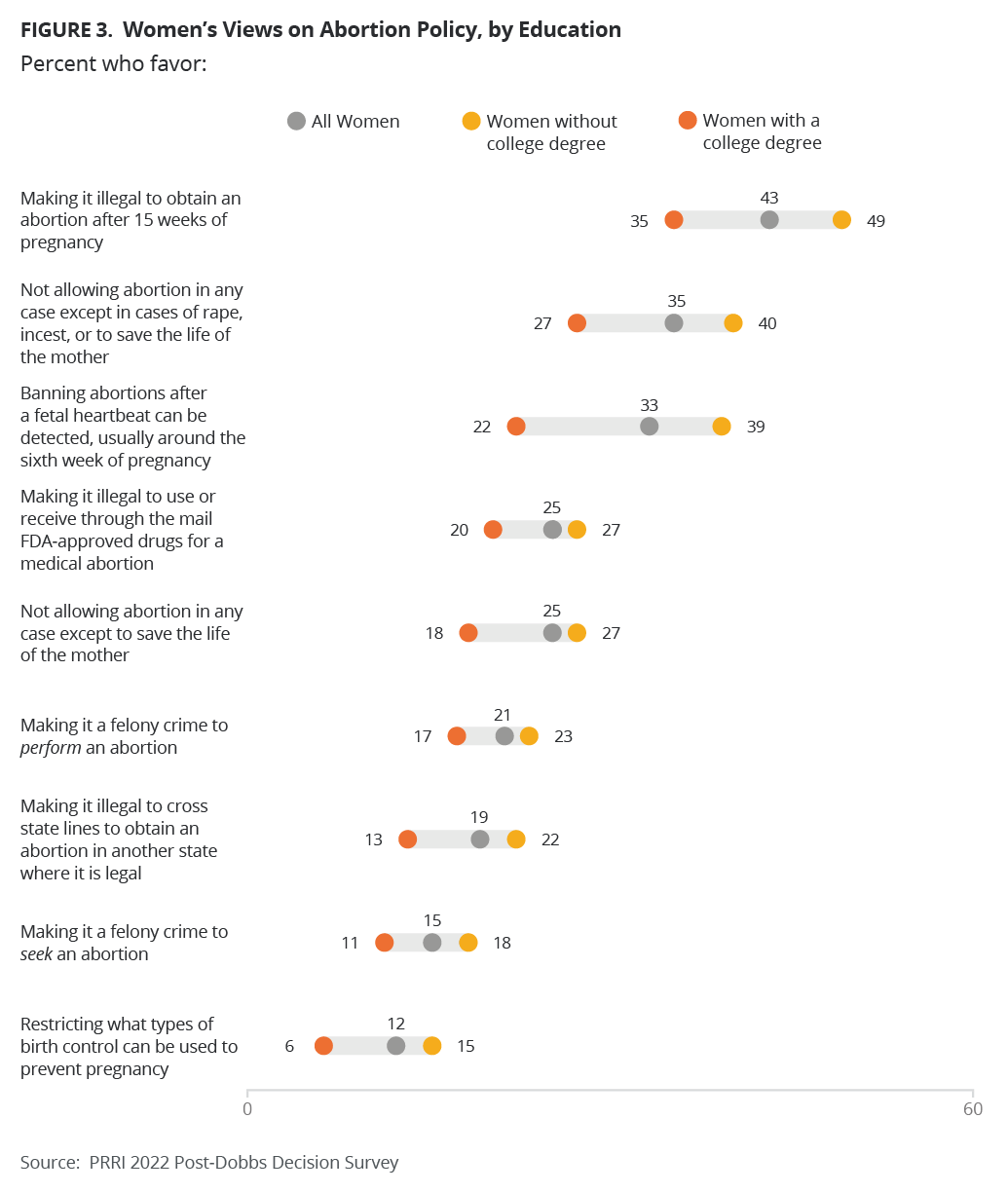Following the U.S. Supreme Court’s historic decision on June 24, 2022, to reverse the constitutional right of women to obtain an abortion, which had been in place since 1973, the vast majority of women continue to oppose restrictive abortion laws. Women who live in the 13 states that have “trigger laws” banning abortion tend are more likely to favor restrictions than those who live in other states. In late June 2022, PRRI asked a series of questions related to Americans’ views on a variety of abortion policies.
Restricting Types of Birth Control
The vast majority of Americans oppose laws that would restrict what types of birth control can be used to prevent pregnancy (84%), and only 14% favor them. About the same proportion of women (12%) favor such laws. Nearly two in ten Republican women (19%), 11% of independent women and 7% of Democratic women favor restrictions on birth control.
Hispanic women (21%) are twice as likely as white women (10%) to favor restrictions on birth control, but due to small sample sizes they do not differ significantly from Black women (13%) or multiracial, Asian, and Native American women (15%). Women without a college degree are twice as likely as women with a college degree to favor restrictions (15% vs. 6%).

Abortion Pills
Seventy-two percent of Americans oppose laws that would make it illegal to use or receive through the mail FDA-approved drugs for a medical abortion, compared to 26% who favor them. The proportion of women who favor restrictions on abortion pills is about the same (25%).
Republican women are divided over laws that make abortion pills illegal, with 42% favoring and 55% opposing them. Only 23% of independent women and 13% of Democratic women favor laws that make abortion pills illegal.
One in five Black women (20%) and about one in four white women (25%), Hispanic women (27%), and women of another race (26%) favor restrictions on abortion pills. College-educated women are notably less likely to favor these laws than women without a college degree (20% vs. 27%). By contrast, women who have children are significantly more likely than women without children to favor laws that make abortion pills illegal (32% vs. 22%).
Women who live in the 13 states where abortion bans were automatically triggered by the U.S. Supreme Court’s decision are more likely than women in other states to favor making abortion pills illegal (35% vs. 22%).
Making It a Felony to Seek or Perform an Abortion
Only a few Americans favor laws that make it a felony to seek or perform an abortion, but those who do are more likely to favor criminalizing performing an abortion (23%) than to favor criminalizing seeking an abortion (17%). This trend is the same among American women (21% vs. 15%).
While less than one in ten Democratic women favor laws that make it a felony crime to perform (6%) or to seek (5%) an abortion, much larger proportions of Republican women favor these laws (45% and 34%, respectively). Independent women are twice as likely to favor criminalizing performing an abortion than to favor making it a crime to seek an abortion (18% vs. 9%).
There are some differences in support for criminalizing either performing or seeking an abortion among Black women (14% and 9%), multiracial, Asian, and Native American women (16% and 13%), and Hispanic women (23% and 18%), but the differences are only statistically significant among white women (22% vs. 16%). Similarly, the difference is not statistically significant among women without a college degree when considering the criminalization of performing or seeking an abortion (23% vs. 18%), but is significant among women with a college degree (17% vs. 11%).
About one-third of women who live in the 13 states with trigger bans favor criminalizing performing an abortion (33%) and one in four favor the criminalization of seeking an abortion (22%). These numbers are lower in all other states (18% and 14%).

Banning Abortion Except to Save the Life of the Mother and in Cases of Rape or Incest
Only one in four Americans (25%) support banning abortion in all cases except to save the life of the mother, while 36% favor bans that include exceptions for cases of rape and incest, in addition to an exception for the life of the mother. The same is true among women (25% and 35%, respectively).
Republican women are significantly more likely to favor laws that include exceptions for rape and incest and for which the only exception is to save the life of the mother (59% and 44%, respectively) than independent (32% and 22%, respectively) and Democratic women (20% and 11%, respectively).
Similarly, women in all racial groups are more likely to favor bans that include exceptions for rape and incest cases than bans that only make an exception for saving the mother’s life. This is true of Hispanic women (38% and 28%, respectively), women of other races (37% and 24%, respectively), white women (36% and 23%, respectively), and Black women (30% and 24%, respectively).
Women who live in the 13 states where abortion bans were triggered automatically are significantly more likely than women who live in all other states to favor bans on all abortions except to save the mother’s life (40% vs 20%), but both are more likely favor less restrictive bans that include exceptions for cases of rape and incest (49% vs. 33%).
Banning Abortions After Six and 15 Weeks of Pregnancy
One-third of Americans (35%) favor laws that would ban abortions after a fetal heartbeat can be detected, usually around the sixth week of pregnancy. However, significantly more Americans (44%) favor laws that would make it illegal to obtain an abortion after 15 weeks of pregnancy. This trend is the same among women (33% and 43%, respectively).
The majority of Republican women favor laws that would make it illegal to obtain an abortion after 6 weeks of pregnancy (60%) and even more Republican women favor bans after 15 weeks (73%). Among Democratic women, approximately two in ten favor both 6-week and 15-week bans (18% and 22%, respectively). Independent women fall in between Republicans and Democrats on both questions (28% and 45%, respectively).
About half of white women (48%) and Hispanic women (49%) favor laws that would make it illegal to obtain an abortion after 15 weeks of pregnancy, compared to 32% of women of other races and 27% of Black women. More than one-third of white women (36%) favor laws that would ban abortions after a fetal heartbeat can be detected, usually around the sixth week of pregnancy.
Women without a college degree are notably more likely than women with a college degree to favor laws that would make it illegal to obtain an abortion after 15 weeks of pregnancy (49% vs. 35%). Similarly, women who live in the 13 states where abortion bans were triggered automatically are significantly more likely than women who live in other states to favor laws banning abortion after 15 weeks (58% vs. 41%).
Crossing State Lines to Obtain an Abortion
The vast majority of Americans oppose laws that would make it illegal to cross state lines to obtain an abortion in a state where it is legal (77%), and half of Americans say they strongly oppose such laws (50%). Yet, one in five Americans (20%) favor such laws, as do 19% of all American women.
About one-third of Republican women (34%), 15% of independent women and 12% of Democratic women favor laws that would make it illegal to cross state lines to obtain an abortion.
Women without a college degree are more likely than women with a college degree (to favor making it a crime to cross state lines to obtain an abortion 22% vs. 13%). There are no racial differences on this question, however.
